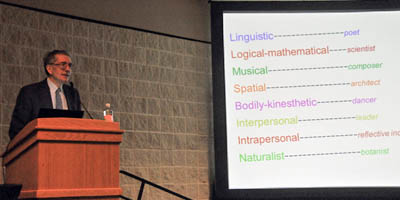
INVITED PLENARY #3323
Howard Gardner
Theory of Multiple Intelligences: First 29 Years
American Psychological Association
120th Annual Convention
Orlando, Florida, August 2-5 2012

|
"An intelligence is the biopsychological potential to process information in certain ways, in order to solve problems or fashion products that are valued in a culture or community." |
| Our 8 Intelligences: |
|---|
1. Linguistic ---- poet |
2. Logical-mathematical ---- scientist |
3. Musical ---- composer |
4. Spatial ---- architect |
5. Bodily-kinesthetic ---- dancer |
6. Interpersonal ---- leader |
7. Intrapersonal ---- reflective individual |
8. Naturalist ---- botanist |